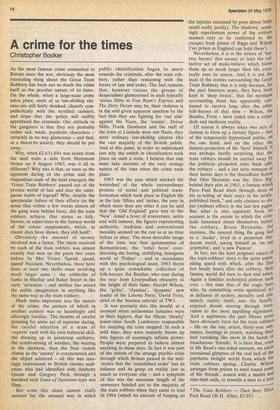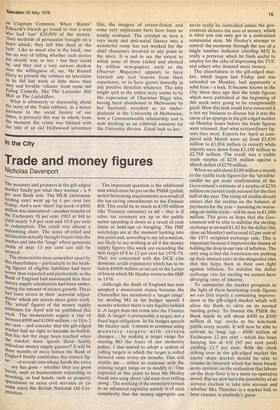A crime for the times
Christopher Booker
As the most famous crime committed in Britain since the war, obviously the most interesting thing about the Great Train Robbery has been not so much the crime itself as the peculiar nature of its fame. On the whole, when a large-scale crime takes place, most of us law-abiding citi zens are still fairly shocked, identify sympathetically with the terrified cashiers, and hope that the police will swiftly apprehend the criminals. Our attitude to the gangsters is that they are probably rather sad, weak, psychotic characters – certainly in no way glamorous – and that, as a threat to society, they should be put away.
Why, when £2,631,684 was stolen from the mail train a mile from Mentmore House on 8 August 1963, was it all so different? Why was it that, so soon as the apparent daring of the crime and the stupendous scale of the haul emerged, the 'Great Train Robbery' passed out of the prosaic world of fact and into the ambi guous realm of legend? Why, despite the spectacular failure of their efforts (in the sense that within a few weeks almost all the gang were behind bars), did the train robbers achieve that status as folkheroes, as super-stars in the fantasy world of the colour supplements, which, as recent days have shown, they still hold?
Obviously the amount of money involved was a factor. The share received by each of the train robbers was almost exactly that won on the pools two years before by Mrs Vivien 'Spend, spend, spend' Nicolson. Nevertheless, there have been at least two thefts since involving much larger sums – the robberies of banks in Mayfair and Baker Street in the early 'seventies – and neither has seized the public imagination in anything like the same way as the train robbery.
Much more important was the nature of the crime, the pattern of which ii
another context was so hauntingly and alluringly familiar. The months of careful planning for some act of supreme daring, the careful selection of a team of 'experts' each with his own technical skill, the dressing up in paratroop uniforms, the synchronising of watches, the waiting in the darkness, then the final violent climax as the 'enemy' is overpowered and the object achieved – all this was teasingly reminiscent to British cinema audi
ences who had identified with Anthony Quinn and Gregory Peck through a hundred such Guns of Navarone-type war films.
But even this alone cannot really account for the unusual way in which
public identification began to move towards the criminals, after the train robbery, rather than remaining with the forces of law and order. The fact remains that, however vicious the groups of desperadoes glamourised in such typically 'sixties films as Von Ryan's Express and The Dirty Dozen may be, their violence is in the end given apparent sanction by the fact that they are fighting for 'our side' against the Nazis, the 'enemy'. Driver Mills, Frank Dewhurst and the staff of the train at Linslade were not Nazis, they were ordinary law-abiding citizens like the vast majority of the British public. And at this point, in order to understand just why the switch in identification took place on such a scale, I believe that one must take account of the very strange nature of the time when the crime took place.
1963 was the year which marked the watershed of the whole extraordinary process of social and political transformation which took place in English life in the late 'fifties and 'sixties, the year in which more than any other it can be said that the 'Old England' gave way to the 'New'. Amid a fever of irreverence, satire and wild rumour, the figures representing authority, tradition and conventional morality seemed on the run as at no time before or since. The most desirable image of the time was that quintessence of Romanticism, the `rebel hero' overthrowing the boring, stultifying, bourgeois world of 'Father' – and in accordance with this psychological need, 1963 threw up a quite remarkable collection of folk-heroes: the Beatles, who rose during the year from Liverpudlian obscurity to the height of their fame; Harold Wilson, the 'gritty', `classless', 'dynamic' new leader of the Labour Party; David Frost, chief of the 'fearless satirists' of TW3.
It was precisely into this mould, at a moment when antinomian fantasies were at their highest, that the fifteen 'cheeky' lower-class South Londoners responsible for stopping the train stepped. In such a wild time, they were instantly blown up into figures of seemingly infinite power. People were prepared to believe almost anything in those days. In fact it was part of the nature of the strange psychic crisis through which Britain passed in the mid'sixties that the 'established order' lost its balance and its grasp on reality just as much as everyone else – and a symptom of this was the awesome length of the sentences handed out to the majority of the train robbers when they came to trial in 1964 (which no amount of harping on the injuries sustained by poor driver Mills could really justify). The shadowy, seem ingly superhuman power of the robbers seemed only to be confirmed by the escapes from prison of Biggs and Wilson ('no prison in England can hold them').
Nevertheless, it is in the nature of 'fantasy heroes' that sooner or later the ed lective act of make-believe which blows them up so much larger than life ever tually runs its course. And it is not the least of the ironies surrounding the Great Train Robbery that it is only because, for the past fourteen years, they have been kept in `deep freeze', that the mystique surrounding them has apparently continued to survive long after the other folk-heroes of that time – Wilson, the Beatles, Frost – have faded into a rather drab and mediocre reality. Of course it always takes two acts of fantasy to blow up a fantasy figure – that of the temporarily, hypnotised public, on the one hand, and on the other the fantasy-projection of the 'hero' himself. it was perhaps hardly surprising that the train robbers should be carried away hY the publicity projected onto them after the robbery – and a last tatty remnant Of their heroic days is the threadbare fiction that Otto Skorzeny was the 'Herr Big' behind their plot in 1963, a fantasy which Piers Paul Read abets through most of his re-telling of their story in his newir published book,* and only chooses to dispel (without effort) in the last few pages. But what is also apparent from his account is the extent to which the criininals fantasised about themselves before the robbery. Bruce Reynolds, far instance, the nearest thing the gang had to a 'leader', lived in a perpetual daydream world, seeing himself as 'an ace journalist', and 'a new Pasteur'. In fact, not the least poignant aspect Of the train-robbers' story is the quite astonishing speed with which, after the first few heady hours after the robbery, their fantasy world did turn to dust and ashes. Again a familiar archetypal pattern took over – this time that of the tragic hero who, by committing some egotistical ad in defiance of society, morality and WImately reality • itself, sees his brieflY• enjoyed dream souring through frustration to the most appalling nightmare. And a nightmare the past fifteen years have obviously been for the train robbers – life on the run, arrest, thirty-year seri' tences, beatings in prison, watching their loot vanishing like snow in the hands of treacherous 'friends'. It is here that, even in Mr Read's one-sided account, we catch occasional glimpses of the real hell of the psychotic twilight world from which the train robbers spring. Charlie Wilson arranges from prison to send round sortie of his `friends', armed with a mallet and nine-inch nails, to transfix a man to a tree on Clapham Common. When 'Buster' Edwards's friends go round to visit a man Who had 'lost' £20,000 of the money, 'their methods of persuasion brought on a heart attack; they left him dead in the bath'. Like so much else in the book, one has no way of telling whether such stories are strictly true or not — but they could be, and they cast a very curious shadow ever the willingness of, say, Mr Russell Harty to present the robbers on television as he did last week as little more than cosy and lovable 'villains' from some old Ealing Comedy, like The Lavender Hill Mob or The Ladykillers.
What is ultimately so depressing about the story of the Train robbery, as a minor footnote to the social history of our times, is precisely this way in which, from the moment the crime was blessed with the title of an old Hollywood adventure film, the imagery of screen-fiction and some very unpleasant facts have been so totally confused. The attempt to turn a very nasty and anti-social fantasy into a wonderful romp has not worked for the chief characters involved at any point in the story. It is sad to see the extent to which none of them (aided and abetted by witless newspapers, such as the Observer Magazine) appears to have learned any real lessons from their experience, or to have grown inwardly in any positive direction whatever. The only bright spot in the entire story seems to be the experience of Charm ian Biggs who, having been abandoned in Melbourne by her husband, enrolled as an undergraduate at the University of Melbourne, won a Commonwealth scholarship and is now working as an editorial assistant for the University Review. Good luck to her.



































 Previous page
Previous page